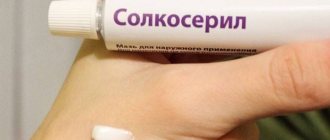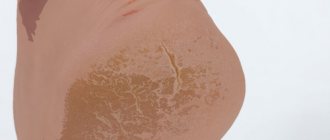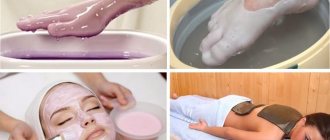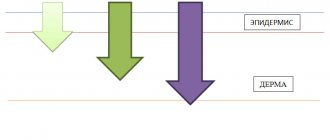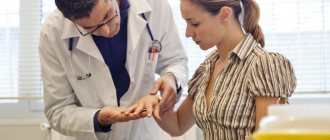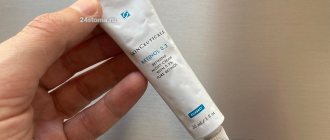Plantar hyperkeratosis is a thickening of the stratum corneum of the epidermis under the influence of physical factors affecting the foot. As the skin thickens, it becomes more resistant to damage and its sensitivity decreases. Hyperkeratosis is one example of the body's adaptive reactions to changing environmental conditions.
Hyperkeratosis becomes a problem in cases where, under the influence of a number of aggressive factors, the metabolism and fluid in the skin of the feet is disrupted, the skin loses elasticity and firmness, as well as mechanical strength.
This leads to the appearance of dry, bleeding or weeping cracks, deep calluses, which cause anxiety and sometimes cause serious pain that limits a person’s physical activity.
The problem of cracked heels
Most often, women experience increased dryness of the skin in the area of the feet, and in particular the heels. Men and children - less often. Painful cracks of varying depths cause pain when walking. In addition, such open wounds are an excellent breeding ground for pathogenic bacteria, which can easily get there.
You cannot ignore cracked heels, nor can you treat them with an ordinary cosmetic moisturizer. Its texture does not allow it to penetrate deep into rough skin. The problem must be resolved by other methods. To get rid of it, traditional methods of fighting, hardware medical techniques and medicines prescribed by a doctor are used.
Diet
Diet for skin diseases
- Efficacy: therapeutic effect after a month
- Time frame: three months or more
- Cost of products: 1400-1500 rubles per week
Nutrition is one of the important factors for skin health. Therefore, a lack of certain substances in the body, in particular vitamins A , E , etc., can lead to similar problems. To avoid them, the menu should include the following products:
- Fatty fish, liver, greens, carrots - to prevent vitamin A .
- Dairy products, nuts, cereals, eggs, vegetables, fruits - to provide sufficient amounts of B vitamins .
- Citrus fruits, sauerkraut, rosehip drinks are sources of vitamin C.
- buckthorn , seafood are sources of vitamin E.
- Bran, legumes - to provide the body with vitamin H.
Causes
A consultation with an experienced doctor at a clinic can help identify the cause of cracked heels. The most common causes of occurrence are:
- Vitamin deficiency in the body. Due to a lack of vitamins A, D and E, the skin begins to become rough and crack. A selected complex of vitamins and the inclusion of a large amount of fruits, vegetables, herbs and nuts in the diet will help correct the situation.
- Lack of fluid intake. A person consists of 75% water, and therefore it plays an important role in the functioning of all vital systems. The norm for an adult is about 2 liters per day.
- Skin diseases. Bacteria and fungi can compromise the integrity of the outer layer, causing the skin to become thicker and more inelastic. It can also be caused by psoriasis, a disease with a hereditary predisposition that can develop against the background of chronic or acquired infections in the body.
- Incorrectly selected shoes. Shoes made from non-natural materials that are too tight in the heel area lead to deformation of soft tissues, excessive sweating and the proliferation of pathogenic bacteria.
- Diseases of internal organs. Diseases there include chronic forms of diabetes mellitus, dysfunction of the thyroid gland and iodine deficiency, disruption of the digestive system and the functioning of the gastrointestinal tract, kidney and liver diseases. All this can lead to disruption of the water-salt balance and the appearance of cracks.
It is recommended to approach treatment comprehensively. First, contact your doctor, examine your body and get tested. Only after eliminating all serious problems can you engage in treatment with traditional methods.
Pathogenesis
On the surface of the soles the skin is quite thick and has a large number of sweat glands. In those places where the main support of the bones falls, there is a pronounced layer of subcutaneous fatty tissue, which protects the bone from external pressure.
With constant stress, as well as exposure to a number of provoking factors, such as wearing uncomfortable shoes, active physical activity, etc., a response is noted: skin surface cells begin to actively divide. hyperkeratosis develops - thickening of the surface layer of the skin. It becomes less elastic and hard, its properties change, and against the background of this, as well as disturbances in the hydrolipid balance and the quality of elastin and collagen fibers, cracks can develop.
Treatment methods for heel cracks
Effective treatment of cracks involves several methods that help to have a comprehensive effect on the skin. These include:
- steaming the skin;
- peelings;
- the use of creams and disinfectants to treat cracks;
- treatment of open wounds.
Special disinfectants help get rid of bacteria and fungus.
Classification
Depending on the characteristics of the disease, there are two types of cracks:
- Superficial (epidermal) - they develop within the epidermis and, healing, disappear without a trace.
- Deep (epidermal-dermal) - develop in the upper layers of the skin, localized in the epidermis and dermis. After the cracks have healed, scars may remain. Very often, deep formations cause pain and bleed. Bleeding formations are called ruptures.
Prevention of heel cracks and folk remedies
Strict adherence to the rules of personal hygiene, wearing only appropriate shoes, a balanced diet and proper care of the skin of the feet will help prevent the appearance of heel cracks.
To prevent cracked heels, special attention must be paid to the selection of shoes. It should be made of natural materials, be well ventilated and fit the size of the foot. You should not buy shoes that are too tight, too big or too small, or with too high a heel - all this increases the stress on the skin of your feet.
Traditional medicine involves the use of compresses, baths and ointments to combat dry skin:
- Compresses. Apply to the heels and moisturize the skin of the feet. After applying the composition to the heels, they are wrapped in plastic film, and socks are put on to enhance the effect.
- Baths. The key to success here is systematicity, and the main ingredients used are sea salt, starch, various herbs and white wine.
- Ointments based on Vaseline or badger fat are an effective remedy that perfectly softens rough skin, making it more elastic and receptive to all procedures.
It is worth noting that rough skin on the affected areas can only be removed using mechanical treatment.
Prevention
To prevent the development of ruptures in the feet, it is necessary to adhere to the following rules of prevention:
- Always wear high-quality, comfortable shoes that fit well.
- Do not overuse tanning to avoid drying out your skin.
- Do not overdo it with peeling, use moisturizing creams regularly.
- Don't wear open shoes too often.
- Eat right, add more fruits and vegetables to your menu.
- If the skin on the feet is very dry, regularly take warm baths with soda and use other moisturizing methods.
- If cracks form on your feet, consult a doctor.
During pregnancy
During pregnancy , the load on the legs increases significantly. In addition, hormonal changes and general changes affect the general condition of the body. As a result, the risk of cracking increases. They appear especially often in late pregnancy.
The expectant mother should consult a doctor about treatment methods. You can use folk remedies - baths, compresses, etc. The doctor may also recommend a vitamin-mineral complex, ointments, creams, etc.
Treatment of heel cracks at the Belleza Clinic
Specialists from the Belleza clinic will help you effectively get rid of the problem of heel cracks. Only professional equipment is used here, and all the technicians have extensive experience in eliminating this problem. With the help of hardware medical pedicure and heel care individually selected by the clinic’s doctors, you will forget about cracks.
In addition to this problem, doctors solve other, more complex problems. For example, laser treatment of nail fungus. Contact the Belleza clinic in Kiev now, make an appointment at a time convenient for you and get advice and help from professionals.
Tests and diagnostics
A dermatologist or podologist conducts a survey of the patient and an external examination, during which this condition is easily determined. It is recommended to consult a doctor if no visible improvement is observed after a week of self-treatment. You should also definitely consult a specialist if the tears are more than 1 mm deep.
If the appearance of cracks is associated with other diseases, additional consultations with specialists, as well as the necessary studies, are prescribed if necessary.
Cosmetic
Complex from Gehwol
The German brand Gevol specializes in solving foot problems. From Gehwol you can select several remedies for complex treatment for cracks.
Fussbad foot bath
The composition includes natural oils of pine, eucalyptus, lavender, rosemary and thyme, which soften rough skin, have an antimicrobial effect and help with healing. The bath time using the product depends on the degree of roughness of the skin and ranges from 15 to 30 minutes. An excellent product for complex treatment and daily care.
It is recommended to use a foot bath during the treatment of cracks of varying depths, as well as to prevent their appearance, at least once a week.
Foot bath recipes
HL Lotion with ceramides
The product, reminiscent of a liquid cream, is absorbed instantly and moisturizes the deepest layers of the skin.
Use as a stand-alone product or after a foot bath. The production uses oat extract, as well as avocado and jojoba oils. But the most important ingredients are ceramides. These substances are always present in the human body, ensuring optimal water-lipid balance of the skin. Thanks to him, she is healthy and copes well with protective functions. It is prescribed both for the treatment of already formed cracks and for prevention. Thanks to its moisturizing properties, the lotion prevents the appearance of ruptures.
Ointment for cracks
Heals tears and wounds and deeply moisturizes the skin due to panthenol in the composition. It is also represented by natural essential oils, bisabolol obtained by extracting chamomile. The product is multifunctional: protects, moisturizes, nourishes the skin, relieves inflammation and eliminates irritation.
To achieve visible results, use the ointment 2 times a day until the problem is completely resolved.
After the tears have healed, the ointment is excluded from care and replaced with a nourishing cream.
Can be used either separately or in combination with a foot bath.
Gehwol products for solving foot skin problems
Doctor Biocon, Foot care cream
Flaxseed, licorice and panthenol quickly heal cracks. The cream is suitable for daily use or after a pedicure.
The product contains natural ingredients, so it has almost no contraindications. You will have to stop using it only if you are allergic to the components of the drug.
To enhance the effect, alternate the care cream with Doctor Biocon balm, which is made specifically for the treatment of chapped feet. The price of the balm is from 90 to 110 rubles.
How to choose foot cream with urea
Scholl, Cream for Cracked Heels
Hypoallergenic cream with urea stimulates skin regeneration and also starts the process of natural healing of cracks. The cream helps get rid of discomfort and has a disinfecting effect. Due to the introduction of vitamin E into the composition, it exhibits powerful antioxidant activity.
Has no smell. The drug should be applied 2 times a day until complete recovery or 3-4 times a week to prevent the formation of ruptures. Not suitable for bleeding cracks.
The greatest effect is achieved when using the cream after treatment with a special Scholl file for cracked heels.
Scholl electric roller file for removing rough skin on feet
Dr. Foot, Cream-balm for cracked heels
Cream-balm with vitamins helps saturate the skin with moisture and beneficial components to start the process of natural regeneration. The first result will appear after 7 days of use - cracks heal, dryness disappears and discomfort disappears.
Prophylactic use of the cream after recovery helps protect the heels from the recurrence of ruptures.
Grandmother Agafya's recipes, Juniper foot cream
Suitable for permanent use, has a pronounced healing effect and prevents the recurrence of cracks. Eliminates excess sweating, which often leads to cracking, by gently drying fabrics. You will be able to see the effect no earlier than after 14 days of daily use.
The main healing component is plantain extract.
Uroderm, Ointment for cracks with urea
The ointment contains urea at a concentration of 30%, being a fairly powerful keratolytic. In addition to urea, the composition includes caring and moisturizing components - panthenol and glycerin. The drug softens the skin and increases its elasticity.
Used as an independent remedy before removing roughness. You can remove keratinized growths 10-15 minutes after applying Uroderm cream using a file or pumice.
To prevent the appearance of cracks, ointment is not suitable - 30% urea can harm healthy skin.
For this reason, after the tears have healed, stop using the ointment and change it to a product with low concentration urea - up to 10%, for example, L'Adeleide "Urea 10%" cream. This will maintain the result, prevent dryness and cracking without harming healthy skin.
Aliexpress, Silicone heel pads for cracks
In a Chinese online store you can find silicone pads that, in addition to fixing the heel in shoes, also heal cracks. Treatment occurs due to mineral oils of jojoba, lavender and rosemary, which are impregnated with the pad. As well as uniform distribution of loads when walking.
You can wear the product no more than 12 hours a day, and before use it is recommended to wash your feet with soap and water. With constant wear for more than 12 hours, air exchange is disrupted, and a greenhouse effect is formed under the overlay, so it is not recommended to use it for prevention.
The price for one pair is about 300 rubles.
Before purchasing, be sure to look at the reviews of a particular seller’s product, since the same product on Aliexpress may differ in quality from different sellers.
Types of foot care creams
Active components
When purchasing a product, pay attention to its composition. Most often, substances with moisturizing and healing properties are used as active ingredients:
- Urea or carbamide is an effective humectant that can also act as a keratolytic.
At a concentration of more than 20 percent, urea destroys protein bonds in keratinized areas of the skin. Many scales form on its surface, which are removed with pumice and a file, and even washed off with a stream of water. Types of keratolytics used in pedicure: a complete guide for masters - Panthenol is a moisturizing component that can act in the deep layers of the skin. This is the most famous stimulator of regeneration - under its influence, cracks heal much faster.
- Glycerin – retains moisture in dry skin and also promotes the healing of cracks and scratches.
- Extracts of medicinal plants - plantain, celandine, calendula, juniper.
They heal breaks and improve the general condition of the epidermis, saturating it with bioactive substances and protecting against infection. feet. Medicinal plants for the beauty of nails and skin
Dexeryl
An excellent remedy for treating dermatological problems. Made in France. Sold in small tubes, cost about 600 rubles.
The basis of the cream is glyceryl and other useful components. Due to this, deep nutrition and hydration of the heels and regeneration of skin cells are observed.
Apply the cream 1-2 times a day, thoroughly rubbing into the damaged area. The duration of the course is determined until the wounds are completely healed.
There are almost no contraindications to the use of the product. The only thing is that the cream is not used for individual intolerance to substances.

